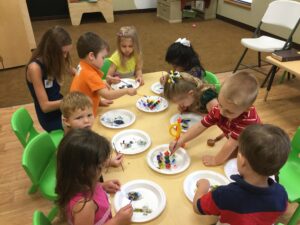
My Breastfeeding Joys, Secrets and Challenges of Nursing Baby
By Barbara L. Behrmann, Ph.D.
I never had any doubt about how I was going to feed my babies. Of course I was going to nurse them! What I don’t know is where my initial determination and enthusiasm came from.
Being a Newbie
Neither my mother nor my grandmother nursed and it wasn’t as if I had grown up seeing women breastfeed. In fact, I can’t recall a single instance during my childhood in which I saw a woman put a baby to her breast.
Why?
Most of what I knew about breastfeeding wasn’t as relevant to me personally, as it was politically. In college I had read about the causes of malnutrition in the developing world and the insidious efforts of multinational corporations to convince women that formula was superior to breastmilk.
So even though I would have access to clean water, refrigeration and money to pay for formula, I wanted nothing to do with formula. Moreover, I thought of my body’s ability to bear and nourish children as a great source of power and pride.
Why would I let some company rob me of that or convince me that my milk was inferior? Nursing was actually the one aspect of having a newborn that I was most looking forward to. I would put my baby to my breast and voila! She would nurse.
Popular Culture
Moreover, I was prepared to nurse my child wherever and whenever necessary. I believed strongly – and still do – that breastfeeding needed to become more visible and would only become the cultural norm when nursing mothers come out of the nursery.
Now, years later after having nursed two children, I realize how incomplete my understanding of breastfeeding was. My first epiphany was that nursing does not always happen easily. My initiation into motherhood was built around a baby who adamantly rejected my breast for almost six, grueling weeks.
Overcoming Challenges
It involved a brief but scary bout of newborn dehydration, supplementing my incipient milk supply with a soy-based formula, (causing me to become less dogmatic) and expressing my milk every three hours around the clock with an electric pump.
I spent many days in tears, wondering if I would ever be able to nurse her at all. With the help of a supportive family and a dedicated and smart lactation consultant, my daughter finally began to nurse.
At first we could only do so in one position requiring no less than four pillows. But gradually my daughter and I learned together and we became more confident, carefree and flexible. I’ll never forget the night I awoke to discover her latched on to my breast, eyes closed, cheeks gently moving in and out. Bliss.
No Right Way to Feel About Breastfeeding
The second thing I learned is that there is no single or correct way to nurse and there is no “right” way to feel about nursing. Moreover, what works for one baby does not always work for another. Nursing my firstborn (after our rocky start) was calming and relaxing for her, regardless of where we were.
But my second was a rather aggressive nurser and easily distracted, making nursing in public difficult. I discovered that sometimes nursing in private really was necessary, political statement be damned! Today I remain as personally and politically committed to nursing as ever, but my beliefs are tempered with the realization that each woman’s experience is her own.
Nutrition and Connection
Perhaps the most important thing I learned, though, is that breastfeeding is not simply a matter of providing nutritional and immunological benefits to one’s child and it encompasses many things that are difficult, if not impossible, to learn in a “how-to” book.
I had to discover on my own that nursing can really be about how we mother our children. My daughters nursed not only when they were hungry, but also for comfort. They nursed when they were hurt, tired, frustrated or cranky. And they nursed for the pure joy and delight it gave them to be enveloped by my body, to feel my skin against theirs.
For my first daughter, in particular, nursing was the center from which she gained the security and confidence to explore her world. And although I once had vowed never to nurse a child who could ask for it in words, I could find no reason to force her to wean from something she so dearly loved. And for the most part, that I did to.
How Long?
It was only during my second pregnancy, when nursing became too physically painful, that I had to wean her completely. Several more years of nursing later, I was ready to burn my nursing bras and reclaim my body as my own.
But I love that I was able to provide my children with something that gave them not just optimum nutrition, but supreme satisfaction. I love that I was able to watch every ounce of tension in their bodies drain away after five sucks at my breast.
And I sometimes miss the humor that often accompanies a nursing toddler, the way they once enjoyed a snack of cookies and milk, the mantras they would chant in honor of my breasts. I miss the kind of intimacy that we shared, a connection that started out so primal, so basic and turned into a love affair unlike any other.
My experiences have strengthened my resolve to work toward creating a culture in which breastfeeding is the norm. But I also realize that each woman must feed her children based on the unique circumstances of her life.
Nursing in a formula-feeding culture isn’t always easy – it sometimes requires strength, determination, and tenacity – not qualities typically used to describe nursing mothers. But for me, the journey was well worth it!









